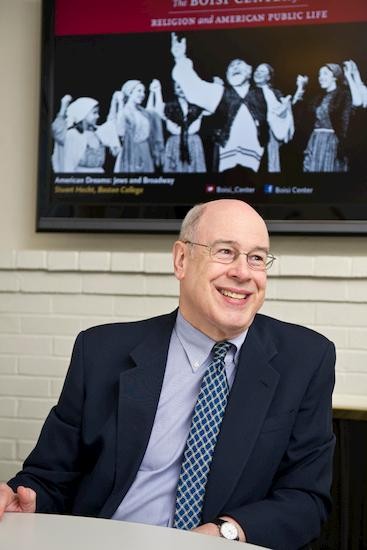American Dreams: Jews and Broadway

Abstract
The promise of the American Dream brought mass-migration of Jews between 1880-1920, with many settling in New York City’s Lower East Side slums. By the 1930s their children had Americanized and improved their lot and formed an increasing percentage of the Broadway audience, supporting musicals that were almost exclusively written by Jewish composers, lyricists and librettists. Not surprisingly, the Broadway musical reflected their collective journey of upward mobility. In their hands, most Broadway book musicals came to project an inclusive vision of America through a form which they inadvertently developed into a template on how to achieve those lofty ends: success through assimilation. This Broadway musical “template” has subsequently been used by other fringe groups to gain legitimacy in the eyes of the American mainstream, be it women, gays, African Americans, Latinos/Latinas, amongst many others.
Speaker Bio

Stuart Hecht is Associate Professor of Theatre Department at Boston College, where he teaches and directs after spending thirteen years as Department Chair. His book Transposing Broadway: Jews, Assimilation and the American Musical has just been released by Palgrave Macmillan Press. He is the long-standing Editor of New England Theatre Journal, and his articles in theatre history have appeared in Theatre History Studies, Journal of American Drama and Theatre, Theatre Journal, Chicago History, The Journal of Popular Culture among others. He has written extensively on Chicago theatre and more recently turned his attention to the American musical. Hecht has long been an officer for the American Theatre and Drama Society, is a member of the Chicago Theatre Symposium and is also a member of the New England Theatre Conference's College of Fellows. He worked as dramaturg for Chicago's Goodman Theatre and Wisdom Bridge Theatre before moving to Boston to begin his academic career. He received his B.A. from the University of Michigan and a M.A. and Ph.D. from Northwestern University.
Event Photos

Stuart Hecht, Associate Professor of Theater at Boston College, at the Boisi Center on November 14, 2012.

tuart Hecht, Associate Professor of Theater at Boston College, at the Boisi Center on November 14, 2012.
Event Recap
On November 14 the Boisi Center hosted a lunch colloquium featuring Stuart Hecht, associate professor of theater at Boston College and author of the recently published Transposing Broadway: Jews, Assimilation and the American Musical. Hecht spoke about the influence of Jewish Americans—especially second generation Jewish immigrants in New York—on the development of the Broadway musical. These musicals, Hecht argued, presented a template for success in America, an inclusive vision of America where assimilation is the key to upward mobility. For Jewish composers, lyricists, and audiences, the Broadway stage became a “cultural Ellis Island,” revealing the gateway to achieving the American dream.
Until the 1930s, Hecht noted, Jews portrayed their aspirations for assimilation predominantly through narratives about upper-class white characters. This dynamic began to change with the 1943 premier of “Oklahoma!” This musical featured a comedic secondary character, the Persian peddler Ali Hakim, which marked the introduction of increasingly prominent characters from marginal social groups. By the 1960s, characters from these groups became more commonplace and were even the central protagonists in some shows. The gradual incorporation of these characters into the Broadway mainstream reveals the inclusive vision presented in musicals composed by Jewish Americans.
After seeing how the Jews had used the musical, other underrepresented social groups followed suit, leading to the production of “Hair,” “Rent,” “The Color Purple,” and “The Book of Mormon.” These plays resonated with American audiences, who found they could empathize with protagonists from marginal racial, ethnic, sexual, or religious identities.
Read More
Further Reading
Alexander, Michael. Jazz Age Jews. (Princeton: Princeton University Press, 2001).
Bial, Henry. Acting Jewish. (Ann Arbor: University of Michigan Press, 2005).
Furia, Philip. “America’s Great Lyricists.” The American Scholar (Summer 1997), 379-394.
Gabler, Neal. An Empire of Their Own: How the Jews Invented Hollywood. (New York: Knopf Doubleday Publishing Group, 1989).
Hamm, Charles. Irving Berlin—Songs from the Melting Pot: The Formative Years, 1907-1925. (New York: Oxford University Press, 1997).
Hecht, Stuart J. Transposing Broadway: Jews, Assimilation and the American Musical. (New York: Palgrave Macmillan, 2011).
Knapp, Raymond. The American Musical and the Performance of Personal identity. (Princeton: Princeton University Press, 2006).
Lehman, David. A Fine Romance: Jewish Songwriters, American Songs. (New York: Nextbook, 2009).
Most, Andrea. Making Americans: Jews and the Broadway Musical. (Cambridge, MA: Harvard University Press, 2004).
Rogin, Michael. Blackface, White Noise. (Berkeley: University of California Press, 2002).
Sandrow, Nahma. Vagabond Stars: A World History of Yiddish Theater. (Syracuse: Syracuse University Press, 1977).
Smallwood, Stephanie E. Saltwater Slavery: A Middle Passage from Africa to American Diaspora. (Cambridge, MA: Harvard University Press, 2008).
Sollors, Werner. Beyond Ethnicity: Consent and Descent in American Culture. (New York: Oxford University Press, 1986).
Read More
Broadway Musicals: A Jewish Legacy is the first documentary film to explore the Jewish-American influence in the development of Broadway musicals. Stuart Hecht, Associate Professor of Theater at Boston College, discussed the significance of the Jewish musical heritage at a Boisi Center colloquium on November 14, 2012. Hecht is among the experts interviewed in the PBS documentary.
Broadway Musicals premieres on January 1, 2013, at 9:30pm EST (check local listings).

